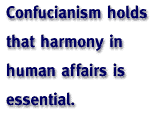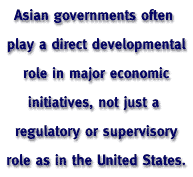 Despite the rhetoric surrounding the U.S. Senate hearings on campaign finance, it became clear that Asians and Asian-Americans who contributed to the Democratic campaign coffers in the late 1990s did so in an effort to help overseas friends in high places gain contacts and prestige here. Their actions were NOT intended to buy improper political influence.
Despite the rhetoric surrounding the U.S. Senate hearings on campaign finance, it became clear that Asians and Asian-Americans who contributed to the Democratic campaign coffers in the late 1990s did so in an effort to help overseas friends in high places gain contacts and prestige here. Their actions were NOT intended to buy improper political influence.
In the United States, businesses hold a deep distrust of politicians and government bureaucrats, whereas in Asia government-to-business relations are far less adversarial. By recalling the events that were probed at the Washington hearings, Western business people can gain insight into doing business in Asia.
 From Democratic fund-raiser John Huang, to Charlie Trie of Little Rock, Ark., to the Buddhist nuns of the Hsi Lai Temple near Los Angeles, these minions were seeking to do good for their respective superiors and thereby bask in reflected glory. Instead of sinister motives, cultural differences were in evidence.
From Democratic fund-raiser John Huang, to Charlie Trie of Little Rock, Ark., to the Buddhist nuns of the Hsi Lai Temple near Los Angeles, these minions were seeking to do good for their respective superiors and thereby bask in reflected glory. Instead of sinister motives, cultural differences were in evidence.
When nun Venerable Man-Ya was asked if she did not realize that Vice President Al Gore’s visit to her Temple was a fund-raiser, she replied, “We see people. We don’t see politicians.” Later, when the Temple’s treasurer, Venerable Yi-Chu, was asked to explain why she destroyed documents relating to the event, she replied she did so because she was afraid the documents would embarrass the Temple after the news media got hold of the issue, not because she sought to cover up for Gore. She was protecting her protectors. How very Buddhist! How Confucian!
Confucianism holds that harmony in human affairs is first and foremost. Those in relationships — be they within the family, the organization or the nation — are expected to work together for the greater good of the whole. Rulers, leaders and dominant figures are responsible for the welfare of subordinates. Collectivist philosophies, such as Confucianism, are rife with nurturing, collaborative expectations between rulers and subjects. They are also the cultural keystones of most government-business relationships in Asia.
 As the rest of the business world has observed — with considerable envy — these traditional cultural methods have been showcased during the last two decades of rapid economic results in Japan, Singapore, South Korea, Taiwan, Malaysia, Thailand and Indonesia. “Japan, Inc.” epitomized that nation’s successful government/ business collaboration in the 1980’s. And State-owned enterprises are still so intertwined with the governments of China and Vietnam that only now are they being pried apart.
As the rest of the business world has observed — with considerable envy — these traditional cultural methods have been showcased during the last two decades of rapid economic results in Japan, Singapore, South Korea, Taiwan, Malaysia, Thailand and Indonesia. “Japan, Inc.” epitomized that nation’s successful government/ business collaboration in the 1980’s. And State-owned enterprises are still so intertwined with the governments of China and Vietnam that only now are they being pried apart.
Moreover, Asian governments continue to play a direct developmental role in major economic initiatives, not just a regulatory or supervisory role — however meddlesome — as in the United States and many Western countries. Examples are Malaysia’s Multimedia Super Corridor and Singapore’s ” Intelligent Island ” projects in which government is providing tremendous resources, not just infrastructure, to help the private sector tap into the Information Age.
So I say to Westerners: When doing business in Asia, think Confucian! Establish good relations with government entities and the local business partners will welcome you. They will help you do everything legal and appropriate, even orchestrate the moves. But court the rulers, you must.
Just don’t involve yourselves in their political processes. About the Author